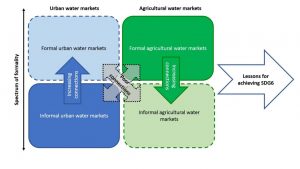Are water vendors villains who extort high prices for the provision of drinking water to the poor in urban areas, or are they increasingly essential contributors to affordable water access? Do agricultural water markets deliver efficient water use, or are they just commoditizing water and concentrating water ownership among those who can afford to pay the most for it?
As it turns out, any of these things could be true, and while they are complicated, as they are found everywhere it is essential to understand their potential contributions to the sustainable, equitable, and efficient use of water.
Understanding the role of water markets in their multiple contexts has been hampered by water markets literature, which continues to separate description and analysis of water markets based on (1) their regulatory ‘formality’, i.e., the degree to which the markets are supported by legal frameworks and formal property rights; (2) the nature of the goods and services being traded; and (3) the location of the market (typically either domestic water use in urban or peri-urban contexts, or agricultural water use in more rural regions).

In WIREs Water, a global review of 148 studies of water markets is used to identify key findings in water market operation and outcomes, including critiques of market function across these multiple operating contexts. Bringing together the work on urban and agricultural water markets in this way helps to strengthen connections between existing sources of evidence.
By 2030, the world has committed to achieving universal access to safe, affordable water supplies, as well as substantially reducing the number of people suffering from water scarcity (SDG 6). This study shows that water markets will have a role to play in reaching the targets of SDG 6, but they will require careful management.
Four specific elements of SDG 6 were identified against which to evaluate the contributions of water markets: (1) safe, affordable, and accessible water; (2) efficient allocation and use of water; (3) environmentally sustainable water management; and (4) appropriate regulation of water use. Water markets have the power to both help and hinder the achievement of environmentally sustainable, equitable, and efficient water access, and the size and nature of their impact will hinge on effective governance and institutions.

















